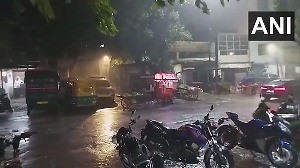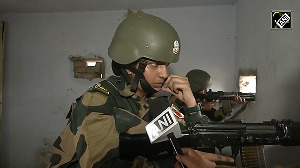 Rahul Gandhi thinks his imaginary Congress is the silver bullet; Narendra Modi thinks he himself is the silver bullet; Arvind Kejriwal seems to think that neighbourhood councils are a silver bullet. But none of them is right, says Mihir S Sharma.
Rahul Gandhi thinks his imaginary Congress is the silver bullet; Narendra Modi thinks he himself is the silver bullet; Arvind Kejriwal seems to think that neighbourhood councils are a silver bullet. But none of them is right, says Mihir S Sharma.
The best that could be said of Congress vice president and heir apparent Rahul Gandhi in his interview with National Inquisitor Arnab Goswami is that he came across as a man of few and fixed ideas. His performance reminded many of struggling with Hindi essays in middle school: regardless of the question, write about The Cow. With its traditional lack of mercy, the internet has exploded with jokes: ‘Hi, you've reached Rahul Gandhi. Press 1 to change The System, 2 to empower women...’
What is relevant here, however, is Gandhi's insistence on the "real difference" between his party and the Bharatiya Janata Party. The Congress, he said, stood for decentralisation and empowerment; the BJP, for centralisation and the concentration of power. This is a breathtaking reversal of history. Since Indira Gandhi, the central Congress has worked hard to ensure that no powerful challengers emerge from the states.
Meanwhile, the BJP -- which is less a "national party" than a combination of state-level parties loosely held together by an affiliation to the noted social workers and Mahatma-lovers at the Rashtriya Swayamsevak Sangh -- has drawn strength from its creation of powerful state leaders, more closely accountable to their electorates. Gandhi's insistence is particularly odd given his own party's government has passed a series of social-spending laws that are justly criticised for being overly centralised, forcing parameters set by New Delhi on spending everywhere in the country.
It is worth noting, in a way, that this discussion is entirely the upshot of 10 years of this generous social spending by the United Progressive Alliance -- largely successful in many ways, if one looks at education, health and consumption indicators. But when there's money being spent in such amounts, people want to refocus attention on last-mile accountability. Gandhi, the BJP's Narendra Modi, and Delhi Chief Minister Arvind Kejriwal all have different opinions on how this can be brought about. Gandhi was right to insist that this question of accountability is a major part of what this coming general election will be about. So what are the answers on offer?
The most radical answer is provided, naturally, by Kejriwal. The Delhi chief minister argues in his book, Swaraj, that ‘citizens have no control’ over their government and its spending. His answer: ‘All these grandiose schemes should be abandoned... At least 50 per cent of the annual budget of all the states should be ... distributed to the gram sabhas.’ Radical decentralisation of spending control, Kejriwal believes, is a silver bullet for policymaking: ‘If this happens, education will improve, roads will become better, water would be made available, electricity will be in abundance, health services will improve, poverty will go away and that will solve the problem of Naxalism, too.’ No doubt, also, the heavens will open to shower gold and silver down on a grateful citizenry, all of whom will have miraculously grown an inch taller.
The dangers of Kejriwal's vision are revealed in the person of Somnath Bharti , the MLA for Delhi's Malviya Nagar, who in a moment of brave and passionate accountability led daring raids on various Africans in his neighbourhood -- because, he argued persuasively, his constituents had pointed out their African neighbours were "not like us". It turns out that one problem with giving all power to The People is that The People are sometimes not very nice people. After all, aren't villages across India locations of horrific caste violence, sometimes supported by local councils?
Not to worry, says Kejriwal: ‘There are always sympathisers in the high caste who want to support the backwards when they see atrocities are being committed. In the present system they do not have a voice and they have no role to play. But if gram sabha is an empowered body then these people will raise their voice and be counted.’ Oh, hooray for the upper-caste saviours.
Then there's Modi. Modi has been among the most vocal supporters of what he sees as states' rights in this country. On Republic Day last year, he said: "By virtue of being closer to the people, state governments can respond much better in understanding and fulfilling the expectations of the people." He added that under the UPA there had been a "systematic onslaught on the federal structure", and ended with the pious admonition that "the states must co-ordinate with the Union government and not remain subservient to it".
Among his complaints: revenue sharing; the communal violence Bill; counter-terrorism efforts; even a modification to the law governing security on the railways. But, on Panchayati Raj, Modi is much more circumspect than Kejriwal. Addressing a conference on the subject last year, he listed a large number of state-level schemes that he said had helped Gujarat's villages.
The problem with Modi's federal vision is two-fold.
First, it's probably just self-serving. A chief minister who prizes "strength" will demand more power; if and when he becomes prime minister, will he be quite as ready to give power away? At that moment, will he not speak of his "mandate", another location for accountability?
Second, many recent problems with policymaking and reform emerge from the power given to India's states. It is Modi as Gujarat's chief minister, in fact, who remains the main stumbling block to the implementation of crucial tax reform, the goods and services tax. Regulation of natural resource extraction and clearances to make business easier are both more opaque at the state level.
And, finally, there's police reform, which no state wants to act on -- but which is as close to a universally popular move as anything. In other words, if the question is major reform of accountability, is devolving powers to states sufficient? Most have shown themselves to be quite unwilling to reform the institutional structure to grant greater accountability. Modi himself stalled the appointment of a Lok Ayukta, or ombudsman, in Gujarat for a decade.
Gandhi's answer to the question of accountability is perhaps the oddest. A political party with primaries, which opens its doors to people who are not traditional politicians -- but which, unlike Kejriwal's Aam Aadmi Party, has "structure" -- is really what's needed, he argues. (Note "structure" is good, but "system" is bad.) He may be right, to an extent. But, as his interview revealed, that isn't enough. People want a discussion of real-world, government policy, not just McKinseyan musings on organisational reform.
Primaries need to be focused on policy, if they are not to become meaningless beauty contests; but how will that happen when your Youthful Leader reveals little enthusiasm for the nuts and bolts of policymaking? Yes, internal democracy will make parties more accountable. But voters recognise that fixing India's problems will need something additional. That's the less harsh, but equally unpalatable, reality behind the brutal mockery of Gandhi's performance.
Kejriwal seems to think that neighbourhood councils are a silver bullet; Gandhi thinks his imaginary Congress is the silver bullet; Modi thinks he himself is the silver bullet. None of them is right.
Yes, the question of accountability is central to 2014’s election. But there aren't any answers yet.












